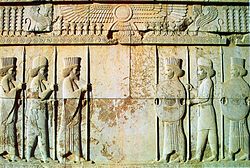"Remember this and stand firm,
recall it to mind, you transgressors,
remember the former things of old;
for I am God, and there is no other;
I am God, and there is none like Me,
declaring the end from the beginning
and from ancient times things not yet done,
saying, ‘My counsel shall stand,and I will accomplish all My purpose.’"
- Isaiah 46:8-10
Arminians of all stripes claim that God could not have predestined all of history, because men have "free will." That is, God could not have determined how all of history, both general and personal, could fall out, because those plans are contingent on the choices of men, which, they claim, are free of constraint.
The problem is that someone forgot to tell God that men have a veto on His plans.
The passage I cite here refers to Cyrus, the king of the Medes (Isaiah 44:28), who was to overthrow the Babylonian Empire, about 160 years after this was written by Isaiah. So, the contingencies here are a series of historical events, including the Babylonian conquest of Judah and the deportation of her people, the rise to power of the Medes, a long line of X marrying Y to produce the family line of Cyrus, and even down to the choice by his parents of the name Cyrus (isaiah 45:13). Yet God is certain of His declaration in this prophecy.
He says, "I will accomplish my purpose." He doesn't ask for permission, or express mere hope, or express any form of uncertainty. His decree was a certainty, not because men would will it so, but because God willed it so!
CHRIST AS LIFE-GIVING SPIRIT (2)
1 day ago





No comments:
Post a Comment